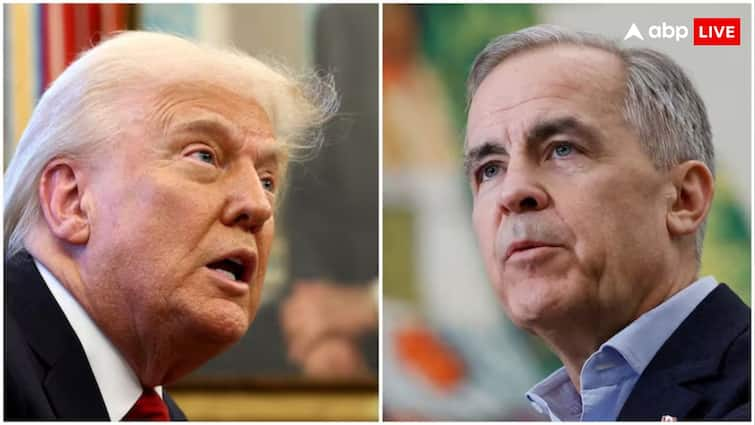Canada stated it would recognize Palestine as a nation if the Palestinian Authority agrees to hold elections and implement certain changes.
US President Donald Trump has imposed tariffs on 96 countries. He has levied a 25% tariff on India and a 35% tariff on Canada. Reports suggest Trump is displeased with Canada due to its recent statement in support of Palestine. Canada may now face economic repercussions as a result of this stance.
The tariff dispute between Canada and the US has been ongoing for some time. Trump initially imposed a 25% tariff on Canada, which has now been increased to 35%. Canada’s support for Palestine has further complicated the situation. The White House has also warned that if goods are rerouted through other countries to avoid the new tariffs, an additional 40% transshipment charge will be applied.
What was said about Palestine?
Canada had formally announced its intention to recognize Palestine. It stated that during the 80th UN General Assembly session in September 2025, it would recognize Palestine as an independent nation, provided certain conditions were met. These conditions include holding elections in 2026 without Hamas’ participation.
Tariffs imposed on Canada
While Trump has granted relief to Mexico, he has taken a hard stance against Canada. Reports indicate that the US has given Mexico 90 days to negotiate trade deals and tariffs, but Canada has faced immediate enforcement. Canada’s Prime Minister has stated that his government will continue discussions with the US.
Palestine
Palestine is a historic and culturally significant region in the Middle East, with deep ties to major Abrahamic religions, including Judaism, Christianity, and Islam. It has been a center of conflict and geopolitical struggle for centuries, particularly in the modern era due to the Israeli-Palestinian dispute over land and sovereignty. Key sites like Jerusalem, Bethlehem, and Hebron hold religious importance, while the ongoing political situation continues to shape its global significance.
White House
The White House, located in Washington, D.C., is the official residence and workplace of the President of the United States. Completed in 1800, it was designed by James Hoban in a neoclassical style and has served as the home of every U.S. president since John Adams. The building was burned by British forces during the War of 1812 but was later restored and expanded, becoming a symbol of American democracy and leadership.
UN General Assembly
The **UN General Assembly** is the main deliberative body of the United Nations, where all 193 member states have equal representation. Established in 1945 after World War II, it serves as a forum for discussing international issues, adopting resolutions, and coordinating global policies. Key functions include setting budgets, appointing the Secretary-General, and addressing peace and security matters, though its resolutions are non-binding.
Canada
Canada is a vast North American country known for its diverse landscapes, multicultural cities, and rich Indigenous history. Officially established as a confederation in 1867, it evolved from Indigenous settlements and later French and British colonization. Today, Canada is celebrated for its inclusivity, natural wonders like the Rocky Mountains and Niagara Falls, and cultural landmarks such as the historic Quebec City and Parliament Hill in Ottawa.
US
The United States (U.S.) is a diverse and expansive country in North America, founded in 1776 after declaring independence from Britain. Known for its cultural influence, democratic government, and economic power, it has a complex history including colonization, the Civil War, and the civil rights movement. Iconic landmarks like the Statue of Liberty, the Grand Canyon, and the White House reflect its rich heritage and global significance.
India
India is a diverse and culturally rich country in South Asia, known for its ancient civilizations, vibrant traditions, and historic landmarks like the Taj Mahal. With a history spanning over 5,000 years, it was home to the Indus Valley Civilization and later major empires like the Maurya and Mughal dynasties. Today, India is celebrated for its spiritual heritage, festivals, and contributions to art, science, and philosophy.
Mexico
Mexico is a vibrant country in North America with a rich history dating back to ancient civilizations like the Aztecs and Maya, whose ruins, such as Teotihuacán and Chichén Itzá, remain iconic cultural sites. After Spanish colonization in the 16th century, Mexico gained independence in 1821 and today blends Indigenous and European influences in its traditions, cuisine, and festivals. Known for its diverse landscapes, from beaches to mountains, and its lively arts scene, Mexico is a UNESCO-listed cultural treasure.
Hamas
Hamas is a Palestinian Islamist political and militant organization founded in 1987 during the First Intifada (uprising) against Israeli occupation. It emerged from the Muslim Brotherhood and has governed the Gaza Strip since 2007 after a conflict with rival faction Fatah. Designated as a terrorist organization by several countries, Hamas is known for its armed resistance against Israel and its social welfare programs in Palestinian territories.






